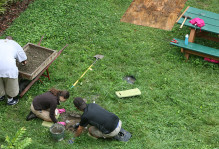Community Development?
Why are we in the Dominican Republic? This question was featured prominently at SOMOS beginning-of-the-year retreat on Saturday. A version of the question (about Nicaragua) was only a little less salient at the MANOS retreat earlier in the semester. The question has many dimensions, an impressive variety of possible responses, and possibly no good answer — depending on your perspective.
SOMOS and MANOS work in the Dominican Republic and Nicaragua (respectively) substantially by chance. I cannot recall and probably never really knew all of the individual motivations that coalesced into decisions to go to either country. In truth, such motivations represent a small part of the focus of the question. They likely are regarded as important, but broader questions are just beneath the surface:
- Do you know the history of relationships between your government and the governments and peoples of the Dominican Republic and Nicaragua? Between American economic and political interests and those of people in the Dominican Republic and Nicaragua?
- Do you know about current and ongoing U.S. political, economic, social, and cultural policies that are constraining the rights and freedoms of people in the Dominican Republic and Nicaragua?
- Do you understand the historical and continuing effects of colonialism in these countries, in Central and South America, in the Southern Hemisphere, and in the developing world?
- Do you understand that efforts to promote “community capacity” and local empowerment may be wasted because larger structural forces may determine the present and future in ways that local efforts cannot meaningfully affect?
- Do you understand the effects of personal decisions that you make or fail to make and how these may undermine, interfere with, or at least be contrary to the goals you are pursuing through efforts in these foreign communities?
- Regardless of your rhetoric, are you confident that you are not extending paternalistic, outside-in, top-down strategies that undermine local agency and disrespect local, regional, and national efforts?
The list could go on, but this should be sufficient to suggest the importance of the seemingly straight-forward question. Undergraduate members of the SOMOS project are asking these questions and, mostly have from the beginning of the projects. We are reminded occasionally by alumni team members to take them seriously.
I am not convinced that the questions would be different if project efforts were focused in domestic communities — in Williamsburg, James City County, small towns in Appalachia, or neighborhoods in east-side Newport News. The “colonialism” question might need to be tweaked a little to make sense, but the substance of the issue almost certainly is just as compelling. It is presumed that we speak a common language and that we share a common history and culture with people in marginalized communities in the U.S., but I doubt it.
I would not presume to answer all or any of the questions on behalf of the projects. I hope we will continue to ask and try to answer them and that we will make some progress at least individually in forming some relevant perspective. My own answer is far from complete, very much still in formation — and likely not very satisfying for many who might ask. Still, I offer a brief summary.
I spent most of my professional career as a criminologist and focused most of my research and investigation on the national drug policy. I was (and am) interested in how we can live together in civil communities where individual rights and differences are respected. I believe that drugs and their production, sale, and consumption constitute one of the major issues to be managed within civil communities. I saw the launching of early versions of “wars on drugs” and I traced the wars over the decades of its campaigns. While Nixon is credited with coining the phrase (1971), in fact U.S. “warlike” policies with respect to drugs can be traced to a much earlier time (see, for example, the passage and enforcement of the marijuana stamp tax act with respect to Mexican and Mexican American farm workers in the American Southwest during the late 1930s). Only a very few would argue that the various drug wars declared by American presidents have had the effect of controlling the use of banned substances, and it’s hard to imagine anyone arguing that such efforts have promoted civil communities. Still, I toiled in the trenches of policy-oriented research for a significant portion of my career, hoping that I could both understand the policies and their effects, and perhaps contribute to enlightened debate about the policies — even as I watched the policies and their implementation contribute to the emergence of international drug cartels, disturbing levels of interpersonal violence at home and abroad, and patterns of immigration that have themselves become the object of domestic political conflict.
The founders of both SOMOS and MANOS approached me at a point in my career when I had run out of patience with policy-oriented research. If I had the chance, almost certainly I would choose to pursue that work again — until I lost patience and energy. I developed a deep appreciation for the ways in which policy decisions are made and the limits of rationality at play in the making of those decisions. I agreed to join the project efforts because I believed that they would provide a new venue for engaging questions about power, oppression, marginalization, alienation, and the prospects for civil community, at a different and more human level. I did not sign on because I believed that I had answers or solutions but because I feel obliged and privileged to ask questions about what might be and because I believe in the power of knowledge and the prospects for social change.


No comments.
Comments are currently closed. Comments are closed on all posts older than one year, and for those in our archive.